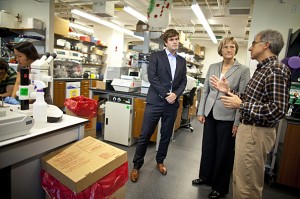
More than 26 million Americans have type 2 diabetes and while there have been many breakthroughs with medical research, these has been no cure found for diabetes. Now, researchers at the Harvard Stem Cell Institute (HSCI) have found a hormone that promises new open pathways for diabetic treatment. Researchers also believe that the hormone can provide a positive treatment for those suffering from type 1 or juvenile diabetes as well.
The hormone is called betatrophin and when given to mice, it caused them to produce insulin-secreting pancreatic beta cells at up to 30 times the normal rate. These new beta cells only produce a certain amount of insulin, when the body tells them too, this offers a new regulation of insulin, which can assist with the decrease of diabetic complications like vision loss and amputations.
Founders of betatrophin, HSCI co-director Doug Melton and postdoctoral fellow Peng Yi, note that much research still has to be met before this new theory can be used as a treatment for humans, though it is a step in the right direction.
“If this could be used in people, it could eventually mean that instead of taking insulin injections three times a day, you might take an injection of this hormone once a week or once a month, or in the best case maybe even once a year.” said Melton, Harvard’s Xander University Professor and co-chair of the University’s Department of Stem Cell and Regenerative Biology.
Typically, type 2 diabetes spawns in people who are obese and in the United States, that is a lot of people. It has actually been called a national obesity epidemic. The way of life is different than it was 50 years ago and the amount of weight a person carries is living proof of that. As people again weight, their ability to produce that right amount of insulin begins to decrease, which then starts to cause complications.
Melton said, “Our idea here is relatively simple. We would provide this hormone, the type 2 diabetic will make more of their own insulin-producing cells, and this will slow down, if not stop, the progression of their diabetes. I’ve never seen any treatment that causes such an enormous leap in beta cell replication.”
Betatrophin is seen by Melton as a primary treatment for type 2 diabetes, but there is chance that the hormone will play in role in the treatment of type 1 diabetes as well.
“We’ve done the work in mice but of course we’re not interested in curing mice of diabetes, and we now know the gene is a human gene. We’ve cloned the human gene and, moreover, we know that the hormone exists in human plasma; betatrophin definitely exists in humans.” Melton stated.
Melton, who in addition to his roles at Harvard is a Howard Hughes Medical Institute investigator explained, “I would like to tell you this discovery came from deep thinking and we knew we would find this, but it was more a bit of luck. We were just wondering what happens when an animal doesn’t have enough insulin. We were lucky to find this new gene that had largely gone unnoticed before.”
He also adds, “Another hint came from studying something that people know about but don’t think much about, which is: What happens during pregnancy? When a woman gets pregnant, her carbohydrate load, her call for insulin, can increase an enormous amount because of the weight and nutrition needs of the fetus. During pregnancy, there are more beta cells needed, and it turns out that this hormone goes up during pregnancy. We looked in pregnant mice and found that when the animal becomes pregnant this hormone is turned on to make more beta cells.”
This has been an ongoing project for the past four years, but it was on February 10th, 2010 that the researchers learned of a huge breakthrough, Yi recalls, “I was just sitting there at the microscope looking at all these replicating beta cells and I could barely believe my eyes. I never had seen this kind of dramatic replication.”